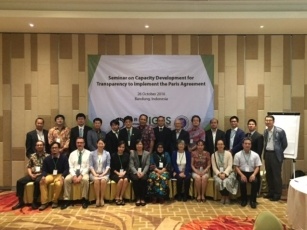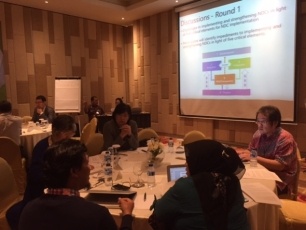Climate Change
Seminar for Capacity Development for Transparency to Implement the Paris Agreement


1. Overview of the meeting
The Ministry of Foreign Affairs of Japan co-hosted the Seminar for Capacity Development for Transparency to Implement the Paris Agreement in Bandung, Indonesia, on 26 October 2016. The seminar was held on the occasion of the Low Carbon Asia Research Network (LoCARNet) 5th Annual Meeting and the Institute for Global Environmental Strategies (IGES) and Bandung Institute of Technology helped organize the event.
2. Participants
The seminar had 37 participants in total, mainly academic researchers, from six Asian countries (Japan, Indonesia, Thailand, Vietnam, Cambodia and Malaysia) and one international organization (UNFCCC Regional Collaboration Centre-Bangkok).
The conference was held in response to the adoption of the Paris Agreement at the twenty-first Session of the Conference of the Parties to the United Nations Framework Convention on Climate Change (COP21) last December. According to the Paris Agreement, all countries including developing countries are responsible for reducing greenhouse gas emissions. The seminar was held with the aim of identifying challenges that the developing countries face and help them specify measures needed as well as of discussing how to provide necessary capacity building.
3. Discussions
The discussion was on the following three topics.
(1) Challenges in developing and implementing NDCs(nationally determined contributions) by developing countries
A series of discussion revealed that the major challenges that face those countries are obtaining data needed for developing NDCs, understanding technical terms in the field as well as selecting and accessing support programs or funds. The participants also shared the view that the knowledge sharing by experts supporting development of NDC is not sufficient, which renders application of best practices difficult.
(2) Specific fields requiring capacity building
The participants were of the opinion that promoting understanding not only by policymakers but also political leaders in each country is necessary for developing and implementing NDCs, and that support for promoting cooperation with the private sector is needed. Some also suggested that it would be beneficial to build an intern system to share best practices among countries.
(3) Role of the research community in developing and implementing NDCs
The Participants reached the conclusion that not only intergovernmental cooperation but also enhanced collaboration with researchers' networks as well as private sector is needed. They were also of the view that cooperation among various stakeholders is beneficial in developing and implementing NDCs.
As a result of the discussion, a summary regarding the future direction of capacity building and cooperation between developed countries and developing countries was issued.
4. Outcome
Various challenges facing developing countries under the Paris Agreement were identified through the seminar, and concrete proposals were made on capacity building and cooperation. The seminar was of great significance in strengthening researchers network, in addition to introducing Japan’s initiatives and sharing the current status of each country with other participants. The seminar could have expanded its scope of participants beyond ASEAN countries in order to have more diverse discussions on various key topics.
The results of the seminar will be reported at the 22nd Conference of the Parties to the United Nations Framework Convention on Climate Change (COP 22) to be held from 7th November to 18th November in Marrakech, Morocco.

